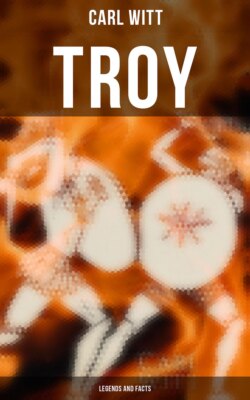Читать книгу TROY - Legends and Facts - Carl Witt - Страница 5
На сайте Литреса книга снята с продажи.
CHAPTER III. GREEKS AND TROJANS.
ОглавлениеTable of Contents
The Greeks now sailed over the wide sea till they reached the coast of Asia, and drew near to the city of Troy. They landed at some distance from the city, and drew up their ships on to the shore, placing them in rows one behind the other. No small distance would anyone have had to go who wished to walk the whole length of one of those rows, and countless were the tents set up for the princes and people to live in. The encampment, with its broad streets and narrow pathways, looked like a town not less in size than the mighty Troy itself.
The Trojans were filled with amazement when they saw from their walls this wondrous camp, stretching farther than the eye could Teach. Yet they did not lose courage, for they had sent to summon all their neighbours to come and help them, and a goodly band of men had hastened to their assistance. But above all they trusted in the fifty sons of their king, Priam. Brave and noble they were every one, but none of them approached in valour the eldest of the brothers, the mighty Hector. He was well skilled, moreover, in the management of armies, and he loved his country far beyond life itself. Amongst the other citizens also, there were many brave heroes; and in case the worst should befall them in the open field, they had their high-walled and fast-barred city in which they could always find a safe refuge. They hoped therefore that the Greeks would soon be obliged to abandon the war, and return, shamed and discomfited, to their own homes. They did not know what a noble band of heroes had ranged themselves under the leadership of King Agamemnon.
Of all the Greeks, the strongest and mightiest was Achilles ; but there were many others not far behind him in valour. There were, moreover, among the host of the Greeks, not only brave men who could fight, but also wise men who could give counsel. The cautious Ulysses was there, and the aged and experienced Nestor, who in his youth had lived much in the company of heroes, and had distinguished himself in many a dangerous conflict. He was now so old that the grandsons of those who had been the companions of his youth were already grown men, and he might well have been excused if he had chosen to remain quietly at home and wait for news of the war till the heroes should return and tell him all about it But his brave spirit would not allow him to rest in idleness, and he preferred to follow the younger men to Troy, and win for himself honour and renown, not only on the battle-field, but still more in the council-chamber. To him the Greeks referred whenever it was necessary to consider which would be the course that would lead the most surely to glory and to gain, for Nestor had the advantage of knowing from his own experience the great deeds of the past which served for warning and for pattern to the men of later times; and when he rose to speak, the words that fell from his lips were so clear and so persuasive, that his opinion always gained the approval of those who listened to him.
Soon the struggle began, and the plain between Troy and the camp of the Greeks was constantly deluged with blood. Yet year after year went by, and the end of the war seemed to approach no nearer, for there were many valiant heroes on both sides, and fate seemed to favour first one party and then the other. It was as when a troop of boys are engaged in some trial of strength, which often lasts a long time before victory declares itself for one side or the other; for when one party seems quite exhausted and on the point of giving way, something inspires them often with new ardour, and putting forward their utmost strength, they succeed in regaining the ground they had lost.
Even the gods on Mount Olympus watched the fight with keen interest, and themselves took part in it, by coming to the help of the mortals who were most dear to them, whether Greeks or Trojans, in their time of need. Hera and Athene had ever loved the Greeks above all other nations, and in this war they were the more ready to help them because they hated Paris and all who fought on his side, and desired their ruin.
Now as the Greeks were far from their homes, they were obliged to take as spoil from the enemy all that they needed to support life. They often therefore made foraging expeditions into the neighbouring towns and villages, headed by Achilles or some other chief, and on these occasions the men were killed, the women were captured as slaves, and all that was worth carrying off was brought back to the camp, when the booty was shared between the chiefs and the people. The people had thus provisions in abundance, and the chiefs filled their tents with vessels of gold and silver and other costly treasures.
